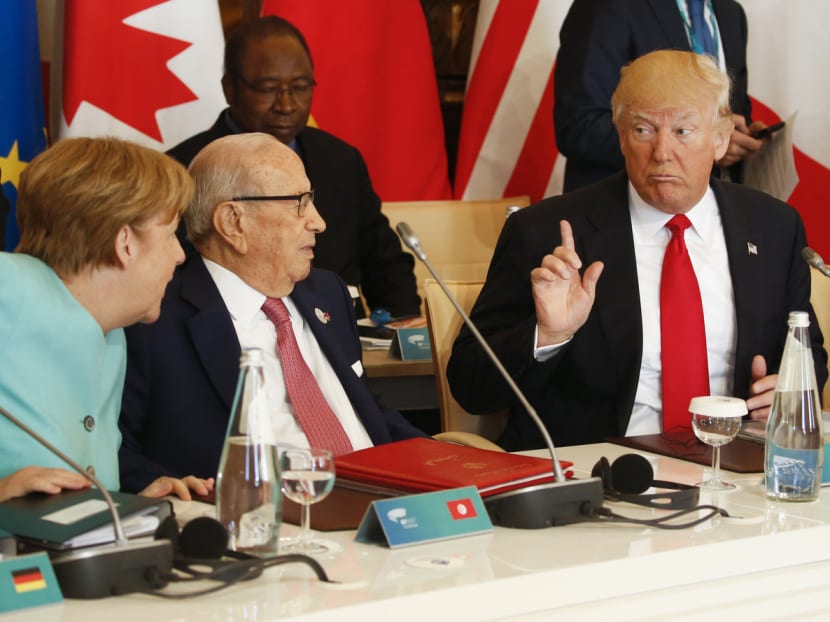Merkel ‘still firm believer in strong German-US ties’
BERLIN — A day after German Chancellor Angela Merkel appeared to question the reliability of the United States as a partner, her office said yesterday that she believes firmly in strong German-US ties and was simply being honest in highlighting policy differences with the White House.

From left: Mrs Merkel talking to Tunisia president Beji Caid Essebsi and Mr Trump at the G7 Summit on Saturday. Analysts say Mrs Merkel’s comments are an acknowledgement of the new reality that the US is heading in a direction on key issues that seems diametrically opposite to where Europe is going. Photo: Reuters
BERLIN — A day after German Chancellor Angela Merkel appeared to question the reliability of the United States as a partner, her office said yesterday that she believes firmly in strong German-US ties and was simply being honest in highlighting policy differences with the White House.
“The chancellor’s words stand on their own — they were clear and comprehensible,” her spokesman, Mr Steffen Seibert, told a regular government news conference in Berlin, adding: “It was a deeply convinced trans-Atlanticist who spoke.”
“Those of you who have reported on the chancellor for a long time will know how important German-American relations are to her,” he said. “They (German-American relations) are a firm pillar of our foreign and security policy, and Germany will continue to work to strengthen these relations.”
“Because trans-Atlantic relations are so important to this chancellor, it is right from her viewpoint to speak out honestly about differences”.
Mrs Merkel sent shockwaves through Washington and London by saying on Sunday that Europe must take its fate into its own hands, implying that the US under President Donald Trump and Britain after its Brexit vote were no longer reliable partners.
Clearly disappointed with Mr Trump’s positions on the North Atlantic Treaty Organisation (Nato), Russia, climate change and trade, she said that traditional alliances were no longer as steadfast as they once were, and that Europe should pay more attention to its own interests “and really take our fate into our own hands”.
“The times in which we could rely fully on others — they are somewhat over,” Mrs Merkel added, speaking on the campaign trail after a contentious Nato summit meeting in Brussels and a Group of 7 meeting in Italy. She did not mention Mr Trump by name. She also spoke of Britain’s decision to leave the European Union, which means the bloc will lose its second-largest economy and one of its two nuclear powers.
Britain’s departure will also weaken trans-Atlantic ties and leave the continent more exposed than before.
Given this new context for international relations, she said, “I can only say that we Europeans must really take our fate into our own hands — of course in friendship with the United States of America, in friendship with Great Britain and as good neighbours wherever that is possible also with other countries, even with Russia.”
Her strong comments were a potentially seismic shift in trans-Atlantic relations. With the US less willing to intervene overseas, Germany is becoming an increasingly dominant power in a partnership with France.
The new French president, Mr Emmanuel Macron, has shown a willingness to work with Germany and to help lead the EU out of its troubles. And Mrs Merkel sees Germany’s future more and more with the group of 27 nations, without Britain after its vote to leave the bloc.
“This seems to be the end of an era, one in which the US led and Europe followed,” said Mr Ivo Daalder, a former US envoy to Nato who is now the director of the Chicago Council on Global Affairs. “Today, the US is heading into a direction on key issues that seems diametrically opposite to where Europe is heading. Merkel’s comments are an acknowledgment of that new reality.”
With her statement, she seemed to be calling for German voters to get accustomed to a more active European role. Mrs Merkel is seeking a fourth term as chancellor ahead of parliamentary elections in September.
Mr Trump campaigned on a platform of trade protectionism, nationalism and scepticism about multilateralism and climate change — all issues on which most European leaders disagree with him. Europeans also depend on Nato for their ultimate defence and are more concerned about an increasingly aggressive Russia than Mr Trump seems to be, although his defence secretary and national security adviser, both senior military officers, insist that the president is fully behind Nato’s Article 5, which requires all members to come to the defence of any country in the alliance that is attacked.
As the American delegation travelled back to Washington over the weekend, White House officials said Mr Trump had succeeded in delivering a blunt message about self-reliance to American allies in Europe.
They said the president’s decision to scold the Nato member countries about their contributions to the defence alliance would reduce the need for the US to carry the financial burden for the Continent’s defence.
The American leader has declared his first foreign trip a resounding success. “Just returned from Europe. Trip was a great success for America. Hard work but big results!” he tweeted on Sunday. AGENCIES






